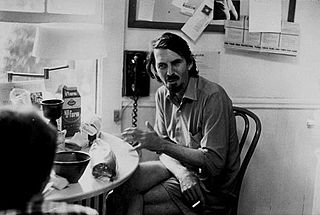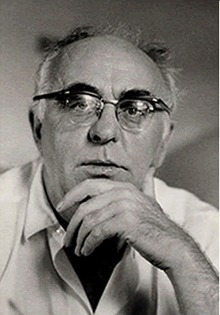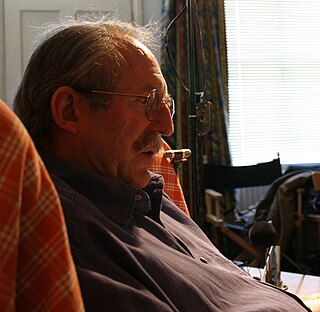
Robert White Creeley was an American poet and author of more than sixty books. He is usually associated with the Black Mountain poets, though his verse aesthetic diverged from that school. He was close with Charles Olson, Robert Duncan, Allen Ginsberg, John Wieners and Ed Dorn. He served as the Samuel P. Capen Professor of Poetry and the Humanities at State University of New York at Buffalo. In 1991, he joined colleagues Susan Howe, Charles Bernstein, Raymond Federman, Robert Bertholf, and Dennis Tedlock in founding the Poetics Program at Buffalo. Creeley lived in Waldoboro, Buffalo, and Providence, where he taught at Brown University. He was a recipient of the Lannan Foundation Lifetime Achievement Award.

Charles Olson was a second generation modernist American poet who was a link between earlier modernist figures such as Ezra Pound and William Carlos Williams and the third generation modernist New American poets. The latter includes the New York School, the Black Mountain School, and some of the artists and poets associated with the Beat generation and the San Francisco Renaissance.

Thomas Moore Raworth was an English-Irish poet, publisher, editor, and teacher who published over 40 books of poetry and prose during his life. His work has been translated and published in many countries. Raworth was a key figure in the British Poetry Revival.
The Black Mountain poets, sometimes called projectivist poets, were a group of mid-20th-century American avant-garde or postmodern poets centered on Black Mountain College in North Carolina.
Cid (Sidney) Corman was an American poet, translator and editor, most notably of Origin, who was a key figure in the history of American poetry in the second half of the 20th century.

Edward Merton Dorn was an American poet and teacher often associated with the Black Mountain poets. His most famous work is Gunslinger.

Paul Blackburn was an American poet. He influenced contemporary literature through his poetry, translations and the encouragement and support he offered to fellow poets.

The New American Poetry 1945–1960 is a poetry anthology edited by Donald Allen and published in 1960. It aimed to pick out the "third generation" of American modernist poets, and included quite a number of poems fresh from the little magazines of the late 1950s. In the longer term it attained a classic status, with critical approval and continuing sales. It was reprinted in 1999. As of 2024, Edward Field and Gary Snyder are the only contributors still living.
Lewis Putnam Turco is an American poet, teacher, and writer of fiction and non-fiction. Turco is an advocate for Formalist poetry in the United States.

Thomas Lux was an American poet who held the Margaret T. and Henry C. Bourne, Jr. Chair in Poetry at the Georgia Institute of Technology and ran Georgia Tech's "Poetry @ Tech" program. He wrote fourteen books of poetry.

Joel Lester Oppenheimer was an American poet associated with both the Black Mountain poets and the New York School. He was the first director of the St. Marks Poetry Project (1966–68). Though a poet, Oppenheimer was perhaps better known for his columns in the Village Voice from 1969 to 1984.
Robert J. Bertholf was an author and professor at Kent State University, and the University at Buffalo. He was the Charles D. Abbott Scholar-In-Residence and former curator of The Poetry Collection at Buffalo.
Donald Merriam Allen was an American editor, publisher and translator of American literature. He is best known for his project The New American Poetry 1945-1960 (1960), one of the anthologies of contemporary American writing he released.
Nationality words link to articles with information on the nation's poetry or literature.
Joe Cardarelli (1944–1994) was a poet, painter, graduate of the Johns Hopkins Writing Seminars, and teacher of writing at the Maryland Institute College of Art for 27 years. Cardarelli pushed generations of MICA artists to incorporate writing into their creative repertoire, and regularly collaborated with his faculty colleagues on projects and performances. He is noted for establishing poetry series such as the Black Mountain poets, St. Valentine’s Day Poetry Marathon, and the Spectrum of Poetic Fire at MICA. In its 25th year, the Spectrum of Poetic Fire reading series still brings quality poets to MICA’s campus for readings during the academic year.
The Berkeley Poetry Conference was an event in which individuals presented their views and poems in seminars, lectures, individual readings, and group readings at California Hall on the campus of the University of California, Berkeley during July 12–24, 1965.
The Jargon Society is an independent press founded by the American poet Jonathan Williams. Jargon is one of the oldest and most prestigious small presses in the United States and has published seminal works of the American literary avant-garde, including books by Charles Olson, Louis Zukofsky, Paul Metcalf, James Broughton, and Williams himself, as well as sui generis books of folk art such as White Trash Cooking.

Richard Denner is an American poet associated with the Berkeley Street Poets and the Poets of the Pacific Northwest. He is the founder and operator of dPress, which has published over two hundred titles, mostly of poetry and most in chapbook format.
Robert Hogg was a Canadian poet, critic, professor, and organic farmer.
Walter E. Bezanson was a scholar and critic of American literature best known for his studies of Herman Melville and contributions to the Melville revival that restored the writer to prominence in the 1940s and 1950s. Bezanson's research and editorial work rescued from neglect Mevlille's unappreciated epic poem, Clarel, and he published essays on Moby-Dick that were widely cited and reprinted.








